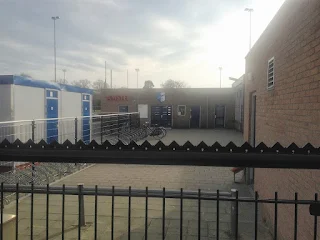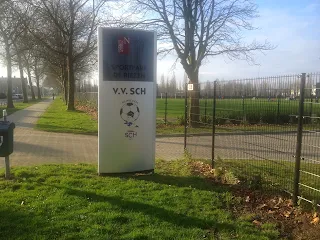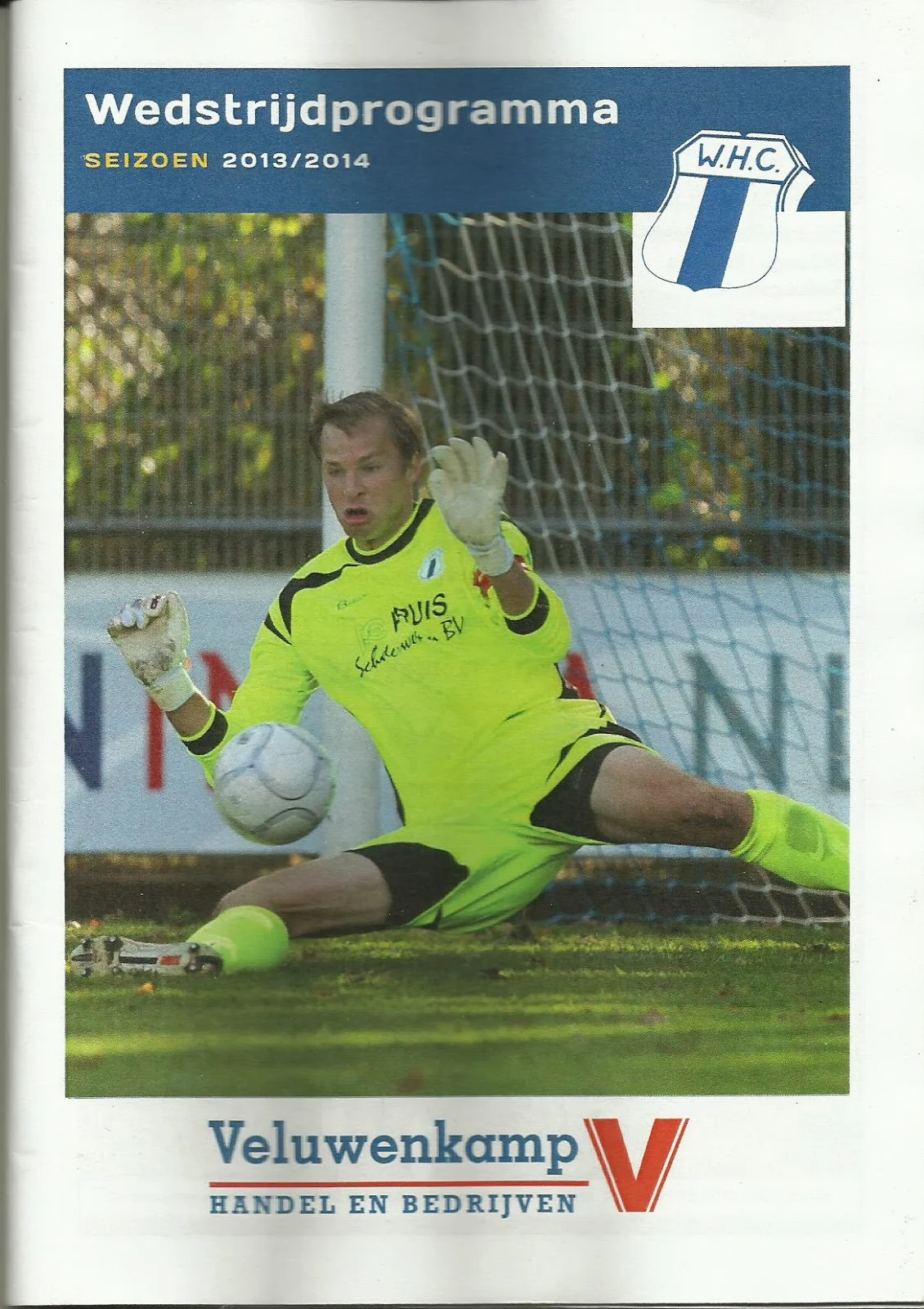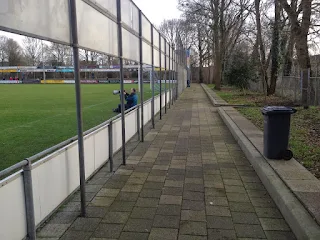Covering the football visits I've made far and wide around the world outside England
Tuesday, 28 January 2014
SV Blauw Wit (Holland)
SCH (Holland)
Gradually, new housing was built in the nearby Waterkwartier district allowing the club membership to grow. However, ‘De Blauwe Jungskes’ gradually went down the divisions over the years.
SCH lasted nine seasons back in Tweede Klasse competition before dropping back down in 1963-64. Four seasons later it became worse as the team were demoted to Vierde Klasse football. The 4E title was won 1969-70 to herald a return to their former status.
The club retained Derde Klasse level for three seasons before being relegated in 1972-73. Back in Vierde Klasse 4E the team finished as runners-up in 1977-78 before winning the title in 1978-79. The jump up proved too steep as SCH had returned within twelve months.
The team remained at that level until 1988-89 when they dropped out to local football before returning and winning promotion in 1990-91 through the play offs. SCH went on to consolidate and then finish as 3D runners-up in 1992-93.
1996-97 saw the Derde Klasse 3D title won, with SCH going one better by claiming the Tweede Klasse 2I title in 1997-98, regaining their place in the first class for the first time in sixty three years.
However, the joy was not to last for SCH as they suffered relegation in 1999-00 and again in 2001-02. Worse was to follow as the club missed a season and were forced to restart at Vierde Klasse level before dropping to the fifth Vijfde Klasse in 2004-05.
Promotion came at the first attempt but the end of the 2008-09 ended in another demotion back to Vijfrde Klasse following a 2-2 play off draw against Eendracht Arnhem. Several mergers for SCH were mooted over the years without fruition before Wim Wouters team won promotion back to the fourth Vierde Klasse in 2010-11.
The 4E title was won in 2012-13 for SCH to make their way back to Derde Klasse 3D where they consolidated with third place on their return. Halfway through the 2016-17 campaign previous indiscretions caught up with the club.
SCH had been reported over disciplinary incidents to the KNVB. The club couldn’t put together an acceptable action plan, so they were expelled from football in January 2017. Sportpark De Biezen was demolished in December 2017.
De Biezen had a substantial cover down the far side, with the rest of the neat venue having hard standing around the pitch with grass beyond.
I was leaving when my presence had been noticed by a club official. I explained that I was from England visiting stadiums and then heading to the NEC match. He seemed delighted with this. I ventured on, taking a look at the match in progress I was walked. It reminded me of Sunday mornings on Olivers Mount Scarborough!
PEC Zwolle (Holland)
Tweede Divisie was streamlined to one third tier league in 1960-61 as PEC, coached by Jan de Roos finished just above the drop zone. The team survived the relegation places through the play-offs before being relegated through them after a defeat to Oldenzaal in 1962-63.
Boys had survived the 1959-60 relegation play-offs before defeat to LONGA sent them down in 1961-62. Both clubs recovered to win promotion back to the third tier with Cor Sluyk in charge of PEC and with Stijger the Boys coach whose team survived another close shave in 1964-65.
Zwolche continued to struggle under former Dutch international Joep Brandes while PEC gradually improved each season. Brandes swapped clubs with remarkable effect. PEC finished bottom in 1968-69 while Boys ended in fifth under Arie Otten.
PEC and Zwolsche Boys merged in 1969, initially playing as PEC. Boys continued as a separate amateur club dropping down to Vierde Klasse 4E football. Pim van de Meent arrived as the coach of the merged club to oversee an improvement with Lody Kragt leading the scoring.
Pepe Fernandez and Freek Schutten helped the team to the runners-up place in 1970-71 under coach Lászlo Zalai after the club had returned to Oosterenkstadion on Ceintuurbaan while Zwolsche Boys moved back to De Vrolijkheid.
The performance was enough to gain the club, now named PEC Zwolle a place in the second tier Eerste Divisie. Herman Heskamp and Jan Hoogendoorn put away the chances as Zwolle finished as runners-up in 1972-73 before missing out on promotion in the play-offs.
The dreams of promotion also ended at the same stage the following season after the appointment of coach Georg Keßler. Kees van Sloten scored goals regularly prior to Hans Alleman leading the side to another runners-up place in 1976-77 which again ended in play-off disappointment.
It was to be double frustration as Zwolle also reached the final of the KNVB Beker final, going down 3-0 after extra time to FC Twente at De Goffert in Nijmegen. The club dusted down to win the Eerste Divisie title and promotion to Eredivisie for the first time twelve months later after the appointment of Fritz Korbach as Ron Jans starred.
Zwolle consolidated in the top flight before coming close to relegation in 1981-82 as it was revealed that the club was in financial trouble after chasing their ambitions and before coming close to bankruptcy.
In 1982 businessman developer Marten Eibrink took over and stabilised the finances, as well as changing the name to PEC Zwolle ’82. He had the stadium renovated and brought in legendary players Johnny Rep and Piet Schrijvens to the club.
However, Co Adriaanse’s team was relegated in 1984-85 before they collected themselves and won promotion the following season as Eerste Divisie runners-up with Foeke Booy scoring the goals as Zwolle once again found their Eredivisie feet.
In 1988 Eibrink left the club citing a lack of interest from sponsors and the local authorities has his reason. At the end of the 1988-89 season Zwolle were relegated once more with sponsors pulling out, players being left unpaid and the true extent of the Slavenburgs Bank debt coming to light. The club were declared bankrupt in 1990.
Theo de Jong was coach at the time looking to try and stabilise things on the pitch as the club started again as FC Zwolle, changing from the city’s green and white colours to blue and white to sever all ties with the previous regime while creating a new club crest.
The team missed out on promotion in the 1990-91 play-offs before several seasons in mid table ensued. Jaap Stam was introduced to the team at the start of a stellar career along with fellow future international Bert Konterman.
In 1996 a bit of local football history was made when Zwolsche Boys left De Vrolijkheid, which would be redeveloped later for retail use, to move to the new Jo van Marle Sportpark in the south of the city.
Jan Everse had arrived as coach as Zwolle took the side to the play-offs in 1996-97 which again ended in disappointment. The club had however turner the corner, once again ending the season at the same stage twelve months later and again in 1998-99.
It was agony again the following season for the team with Dwight Lodeweges as coach as they fell short despite ending as league runners-up. The near misses with promotion continued in 2000-01 before there was no doubt in 2001-02.
The goals of Arne Slot and Richard Roelofsen under Paul Krabbe fired ‘Blauwvingers’ to the Eerste Divisie title in 2002-03 before the coach was replaced by Peter Boeve. The club managed to retain their status through the play-offs upon their return to top level football.
Hennie Spijkerman took over team affairs but could not prevent the team being relegated in 2003-04. There were play-off disappointments in 2004-05 and 2005-06 before the return of coach Everse whose team missed out in 2006-07 and again the following season at the final stage.
The club made the decision to replace Oosterenkstadion with a new stadium on the same complex. Zwolle were given permission despite some reservations owing to the casino which would accompany it. FC Zwolle Stadion opened for the 2008-09 campaign.
Art Langeler was appointed as coach in 2010 after further play-off heartbreaks, His team were denied in the play-off final by VVV-Venlo in 2010-11. Darryl Lachman starred as Nassir Maachi put away the goals to take Zwolle to the 2011-12 Eerste Divisie title and promotion.
Their home venue was renamed IJsseldelta Stadion after the local region while the club returned to the title of PEC Zwolle before the team consolidated their Eredivisie status before former player Ron Jans took over as coach in the summer of 2013.
In 2013-14 the team reached the KNVB Beker final, where they came from behind to destroy Ajax 5-1 in front of an astounded crowd at De Kuip as both Ryan Thomas and Guyon Fernandez scored twice which was added to by a Bram van Polen goal.
Click here to see the remarkable victory.
Zwolle qualified for the 2014-15 Europa League where they went out in the play-off round to Sparta Praha before the displays of Lars Veldwijk helped his team to more European football the following season. In the summer of 2016 IJsseldelta Stadion was renamed MAC³PARK stadion in a sponsorship deal.
A fourteenth place in 2016-17 saw Jans being replaced by John van 't Schip who led the side to ninth prior to the appointment of prodigal son Jaap Stam. His season at the helm ended with Zwolle towards the wrong end of the table
John Stegeman was put in charge of the team in the summer of 2019. PEC were in fifteenth position when the outbreak of Coronavirus ended the season early in which the creativity of Gustavo Hamer shone through.
PEC Zwolle will play in the Eredivisie in the 2020-21 season.
My visit
Once we’d seen the other scores come in we decided to take the easy option and head to the IJsseldelta Stadion in good time. We got on board the no.3 service from Rodetorenplein near to where an ice disco was being set up after a rapid slurp in Cafe Bosch.
WHC Wezep (Holland)
Undaunted WHC regrouped and won the championship the following season by beating Nunspeet in 't Harde in front of 5,000 fans at the final to win promotion to Derde Klasse football. After a couple of third places in Klasse 3A before the team finished as runners-up and then won the promotion play offs.
The 1960’s would bring the glory days to Sportpark Muldersingel as five championships at Tweede Klasse were won. In 1963-64 and 1965-66 the 2C title was won sandwiching a second place in between.
The club was moved geographically to play in Tweede Klasse 2D where WHC were just at home with further title wins in 1966-67 and 1967-68 when an amazing crowd of 11,500 witnessed the completion of the blue and white’s seventh club title for the final against local rivals Go Ahead Kampen Zwolle.
1969-70 saw the 2D championship return to the club. The following season saw WHC win the Saturday Amateur Cup following a victory over Black White '28. Throughout the 70’s WHC played in the top tier of the amateur game, fluctuating between divisions 1A and 1B.
A runners-up spot was achieved in 1971-72 which was followed by a series of mid table finishes before WHC narrowly avoided relegation in 1979-80 following a 5-0 win over SDCP, with 5,000 fans attending the clash in Nunspeet.
However, 1981-82 saw WHC relegated for the first time. Six years later victory over FC Meppel in the final of the Tweede Klasse saw WHC propelled back to the first Eerste Klasse for the 1988-89 campaign.
The team competed in Klasse 1B and 1C for the following nine seasons where the team finished third in 1992-93 prior to being crowned as champions of 1D title in 1996-97 to take the club up to Hoofdklasse football, the highest amateur status of the day.
Probably WHC’s greatest claim to fame came when they were drawn against Ajax in the KNVB Cup. The match on the 23rd December 2009 was moved to the IJsseldelta Stadion home of neighbours PEC Zwolle and ended in a 14-1 win for the visitors in front of a sell-out 10,500 crowd.
To see the action from the game, click here.
The turn of the millennium saw the club consolidate and then end with three third place finishes in the league. Following restructuring of the leagues in 2010-11 WHC failed to gain a place to the Topklasse as Hoofdklasse dropped to the second tier.
After three third place finishes, WHC ended as runners up of Zaterdag Hoofdklasse C in 2010-11 and 2011-12 before being relegated in 2014-15. The team recovered finishing third in 2016-17 and again the following season from where they won promotion through the play-offs.
However, their Hoofdklasse stay lasted just twelve months. When the 2019-20 finished early owing to the Coronavirus outbreak WHC sat in fourth place in Zaterdag 1E Klasse 1D.
WHC Wezep
will play in Zaterdag 1E Klasse 1D Oost in the 2020-21 season.
My visit
As my match of choice at night was PEC Zwolle against Vitesse and to meet up with my old pal Guy Watson, who was going to FC Utrecht v Feyenoord the following day, I wanted a nearby game. The excellent Soccerway website was to prove to be my friend once again.
I followed the crowds and found a temporary club shop. I was delighted to see that there was a match programme. I’m not sure how much I paid for it, as I let the friendly lady take some change from my hand, but she gave me four strips of raffle tickets as well.
WHC grew into the encounter and went ahead on twenty eight minutes when Bunyamin Özkök latched on to a pass inside the area to go round the visiting custodian Ruud Kempers and slot home from a tight angle.


















































